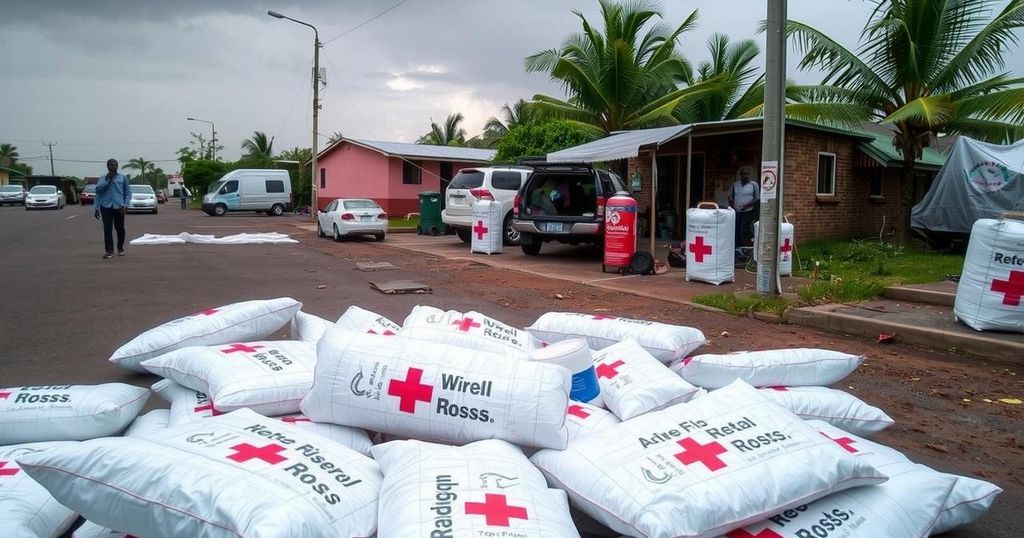World news
AFRICA, CHI, CLIMATE CHANGE, COMOROS, DISASTER MANAGEMENT, DISASTER RELIEF, EUROPE, FLOODING, GENEVA, IFRC, IFRC COUNTRY CLUSTER DELEGATION, INTERNATIONAL FEDERATION OF RED CROSS AND RED CRESCENT SOCIETIES, KENYA, MALAWI, MAYOTTE, NA, NAEMI HEITA, NAIROBI, NATURAL DISASTERS, RED CROSS, SWITZERLAND
Marisol Gonzalez
0 Comments
Red Cross Takes Action Following Cyclone Chido’s Devastation in Mozambique
Cyclone Chido has caused severe devastation in Mozambique and surrounding regions, affecting over 622,000 individuals. The International Federation of Red Cross and Red Crescent Societies has initiated an Emergency Appeal to raise 10 million Swiss francs for immediate relief efforts and to enhance preparedness for future storms. Key initiatives include providing shelter, food, health services, and strengthening community resilience.
The South-West Indian Ocean cyclone season commenced with the arrival of Cyclone Chido, which struck Mozambique on December 15, 2024. This powerful storm generated heavy rainfall and strong winds that affected multiple nations, including Madagascar, Comoros, Malawi, and Mayotte, causing loss of life and extensive destruction to homes and infrastructure. Approximately 622,000 individuals in Mozambique are reported to be affected, with numerous shelters damaged or destroyed. In response, the Red Cross has deployed teams to conduct rescue operations and aid impacted communities.
Initial assessments indicate that the destruction prompted by Cyclone Chido has led to more than 130,000 shelters being either damaged or completely destroyed in Mozambique alone. Similar adverse effects have been observed in neighboring regions, with over 64,000 individuals affected in Comoros and more than 45,000 in Malawi. The situation in Mayotte is dire, with a staggering 70% of the population impacted and over 35,000 houses reported as destroyed. As assessments continue, there is a growing concern regarding the mounting needs for shelter, food, potable water, and health services among the displaced populations.
The International Federation of Red Cross and Red Crescent Societies (IFRC) has initiated an Emergency Appeal in response to the aftermath of Cyclone Chido, aiming to raise 10 million Swiss francs to assist 100,000 affected individuals across Mozambique, Madagascar, Comoros, and Malawi. The comprehensive response plan includes essential support such as cash distribution, shelter assistance, and healthcare services. Key activities encompass the provision of vital household items, facilitating cash assistance, and improving accessibility to water and sanitation resources.
In addition to immediate relief efforts, this appeal seeks to enhance community resilience in anticipation of future storms. Strategies include the establishment of robust early warning systems, pre-positioning emergency supplies, and training volunteers in effective disaster preparedness and response practices. Such initiatives aim to target 500,000 individuals residing in high-risk areas, thereby fostering a proactive approach towards future cyclone threats.
Cyclone Chido is the latest in a series of tropical cyclones that pose significant risks to communities in the South-West Indian Ocean region. The cyclone season poses an ongoing threat, with forecasts indicating an above-average number of storms. The devastation caused by these natural disasters emphasizes the need for immediate humanitarian response, as well as long-term preparedness mechanisms to mitigate future impacts. Such responses are critical in safeguarding vulnerable populations and ensuring their access to necessary resources in times of crisis.
In summary, Cyclone Chido has triggered a humanitarian crisis affecting hundreds of thousands across several nations in the South-West Indian Ocean. As the Red Cross mobilizes resources and efforts to provide immediate relief, the importance of strengthening community resilience through preparedness initiatives is underscored. The ongoing assessments and response strategies highlight a coordinated effort to address the needs of the affected populations while anticipating future challenges posed by an active cyclone season.
Original Source: reliefweb.int




Post Comment